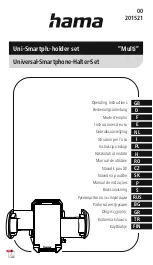
Glossary
Airtime
Actual time spent talking on the wireless phone. Most carriers bill
customers based on how many minutes of airtime they use each
month.
Antenna
A device for transmitting or receiving signals. The size and shape of
antennas is determined, in part, by the frequency of the signal they
receive. Wireless phones and the base station must have antennas.
Call Barring
Ability to restrict outgoing and incoming calls.
Call Diverting
Ability to reroute calls to another mobile or fixed line.
Call Holding
Ability to put one call on standby while answering or making another
call; you can then switch between the two calls, as required.
Call Waiting
Ability to inform users that they have an incoming call when engaged
on another call.
Conference Calling
Ability to establish a conference call involving up to five additional
parties.
DTMF
(Dual-tone Multi Frequency )
You send DTMF signals when you enter numbers by pressing the digit
keys.
Hands-Free
A feature that permits a driver to use a wireless phone without lifting or
holding the handset - an important safety feature for automobiles,
tractors and most other motorized vehicles.
GSM
(Global System for Mobile Communication)
International standard for cellular communication, guaranteeing
compatibility between the various network operators.
GSM covers most European countries and many other parts of the
world.
LCD
(Liquid Crystal Display)
Commonly used to refer to the screen display on the wireless phone.
PIN
(Personal Identification Number)
Security code that protects the phone against unauthorized use.
The PIN is supplied by the service provider with the SIM card.
It may be a four to eight-digit number and can be changed, as required.
PUK
(PIN Unblocking Key)
Security code used to unlock the phone when an incorrect PIN has been
entered three times in succession. The eight-digit number is supplied by
the service provider with the SIM card.
Glossary
156
155
Содержание GPRS778
Страница 1: ...GPRS778 779 PHONE USER MANUAL...


































